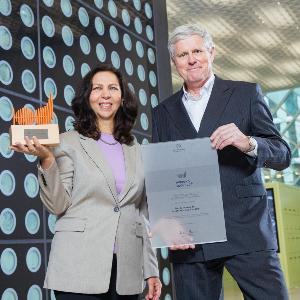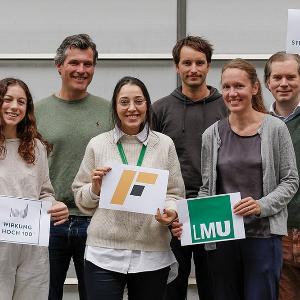Two LMU projects win “Wirkung hoch 100” award
16 Nov 2021
Taking the topic of climate change into classrooms and facilitating the secure sharing of data is the respective mission of the prize-winning projects
16 Nov 2021
Taking the topic of climate change into classrooms and facilitating the secure sharing of data is the respective mission of the prize-winning projects

Dr. Cecilia Scorza with Professor Andreas Schlüter, Secretary General of the Stifterverband | © Kay Herschelmann / Stifterverband
The Stifterverband für die Deutsche Wissenschaft (Germany's donors' association) has crowned the STEM educational project “Climate Change: Understanding and Acting” from the Faculty of Physics at LMU Munich the overall winner of its “Wirkung hoch 100” initiative. “What’s special about our program is that it combines STEM aspects with learning about sustainable development and thus links knowledge closely with action,” says Dr. Cecilia Scorza, astrophysicist and project leader. Because climate change is such a multifaceted and interdisciplinary phenomenon, the program draws on interdisciplinary aspects of physics, mathematics, chemistry, biology and geography.
The program encompasses lectures and workshops, but principally teaching material such as a climate kit ("Klimakoffer") containing experiments the students can do to bring climate change to life. Examples of things the students can investigate include the physics of radiative equilibrium, the albedo effect and the greenhouse effect – and thus the atmosphere’s role in the Earth’s average temperature. The material is there to help teachers design lessons on climate change. But the young people won’t just be learning why climate change exists and how much anthropogenic greenhouse gas emissions are contributing to it, they will also be actively working out how people can mitigate climate change, such as by increasing the availability of renewable energies. The project aims to give students knowledge, to encourage them to think about solutions and potential careers – and ultimately to promote community action beyond the school context. The climate kit has already been used in 250 German schools. “There are no comparable materials out there and the feedback has been extremely positive,” reports Scorza.
The “Wirkung hoch 100” award launched to mark the donors’ association’s 100th anniversary is supporting three innovative projects. First prize in the Education category, along with the prize money, went to the LMU project “Climate Change: Understanding and Acting” sponsored by Bavaria’s Environment Minister Thorsten Glauber, the German Physical Society ("DPG") and the German Meteorological Society ("DMG").

Dr. Hendrik Ballhausen (r.), Professor Christian Hinske (2nd from left) and the Federated secure computing team | © Hendrik Ballhausen
First prize in the Innovation category was also awarded to an LMU scientists’ project: A team from the Faculty of Medicine working with Dr. Hendrik Ballhausen and medical informatics specialist Professor Christian Hinske won the funding prize for their “Federated Secure Computing” project. The scientists are developing a solution that addresses the conflict between the wish to share data in the course of collaboration and the concerns around data privacy and security. This is a problem facing businesses and academia in equal measure, and yet shared data analysis holds so many advantages. “Federated computing is a milestone and will significantly expand the possibilities for research,” says Christian Hinske.
Federated secure computing technology will allow scientists — and many others besides — to share data located on distributed servers without the need to physically exchange it. This allows them to guarantee data security and protect data privacy. The jury’s commendation emphasized the project’s merits: “With its open source code and high level of compatibility, the project holds considerable potential for a wide variety of areas – anywhere where data is generated and collected.”